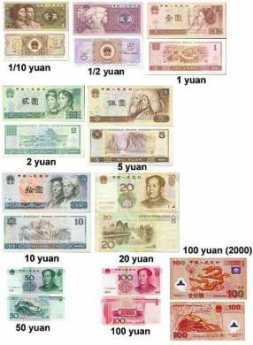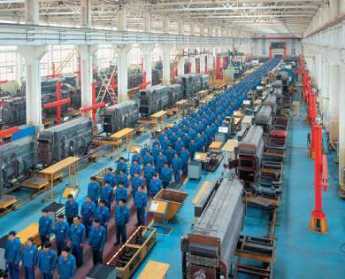Related Topics
Banking Panic 2007-2009 (1)
Mankind hasn't learned how to control sudden wealth, whether in families, third-world countries, or the richest nation in history. The world banking crisis of 2007 is the biggest example yet.
Oriental Money

|
| Yuan |
Rapid enrichment of the Asian poor is the most momentous event of world economic history. In a variety of leggings and blockings the Chinese Communist government held their currency (the yuan renminbi) at levels appreciably below true value in purchasing power and refused to let it float, thus augmenting cheap labor in selling goods abroad at low prices. Foreign attempts to share this wealth, particularly direct foreign investment in domestic Chinese businesses, were severely controlled. From China's viewpoint, the beneficial result was that foreign investors were prevented from upsetting the yuan by either gold-rush investing or suddenly withdrawing their money, as indeed they had done to many other developing countries, many times. However, artificial constraints channel economies into unexpected new directions. As an avowedly communist country, the profits of China's new prosperity could be held by the government, and an amazing 59% was actually held as "savings", with that government easily able to spend 10% of its gross domestic product buying U.S. Treasury bonds. Ultimately, China bought a trillion dollars of U.S. bonds.They got the bonds, we got the money. This flood of new money into the American economy lowered interest rates abnormally. The resulting low rates then stimulated reckless American borrowing, which found its way into a housing boom with cheap mortgages. The confused responses of America to this novel situation will be discussed later, but it must be remembered that both Japan and Germany have quite recently been almost equally single-minded in their export-driven policies. China is the biggest offender, but China will have important allies in the debate.

|
| Chinese Factories |
Abnormally low interest rates. In other circumstances, easy borrowing at low-interest rates might have stimulated business investment in plants and equipment, but American business was preoccupied with shifting domestic factory production abroad to enjoy abnormally low labor costs. The Chinese (and other export-driven nation) government for its part severely blocked direct foreign investment in Chinese factories. The ultimate unintended consequence of these primarily Chinese decisions could be stated thus: it stimulated an American housing boom at the expense of the Chinese peasantry. Things might have gone on to produce other results, but instead came to a sudden paralysis on August 9, 2007, when investors (probably using hedge funds) decided the credit markets had reached unsustainable tension and started selling in large volume. Somehow, this somehow had to do with the American mortgage industry going haywire, because almost everyone suspected that was the case. We now focus on how mortgages went haywire while remembering this was mostly a result of forced adaptations breaking under the external strain of too much easy credit coming from abroad. If it hadn't mortgaged, it probably would have been something else. But it was mortgaged.
American monetary authorities, committed to inflation targeting of short-term interest rates, were probably deceived by low long-term interest rates into believing the Far East Trade imbalances were not seriously inflationary, and might even be deflationary. To protect American banks from paying more for deposits than they could charge for loans, the Federal Reserve lowered short-term rates, which would definitely be inflationary. What happened to America was what happened to a hundred smaller countries; sudden withdrawal of foreign investment caused a recession. In our case, the foreigners did not actually withdraw their money. It was effectively frozen in place by funny business in our own special financial innovations, which we will now describe, growing out of the difficulty that just about anybody entitled to a mortgage already had one. Several steps removed from the commercial credit-paper problem that upset some insiders, panic in the stock market suddenly started on a nice summer morning. On August 10, 2007 the Dow Jones Industrial Average unexpectedly dropped 400 points in ten minutes. The trumpet had sounded.
The full history was of course vastly more complicated than this densely concise synopsis of it, so in fairness, a few main amplifications must be added. China, while large, represented only forty percent of the economies of the newly developing world. Neither Japan nor Germany is a third-world country, but they behaved the same way. Volatility in available reserves of Middle East oil contributed an independent bubble in the midst of the main (home real estate) one. Japan's long depression contributed to a diversion. The secondary economic powers, particularly in Europe, rushed in to imitate what seemed like a new financial paradise, making their resulting problem somewhat worse by having enough sophistication to dabble, but less than enough to cope with unprecedented volatility across national borders. There were also some moderate-sized wars in the Middle East and the usual amount of self-serving international politics. These things must be mentioned, but they are not significantly relevant to the unfolding of the main problem. Which was: A billion desperately poor people grew prosperous in less than a generation. Their government loaned their money to the rest of the world, who then enjoyed a revel of abundant cheap credit. The commotion found a weak spot in American home mortgages, bringing the world financial system to a humiliating halt for confusing but nontrivial reasons.
In theory, the world should now devise a more unified monetary system. It would certainly help to address the conflict between an internationalized economy and the traditionally heedless national control of local currencies. With urgency bred of crisis, a new international monetary system might emerge in time to be helpful with the coming recession. Smaller steps might be more achievable; the question is whether they will be adequate. Everyone's most pressing problem is to concentrate on patching together the American banking and mortgage system, possibly buying time to get the world to cooperate on broader issues. The miracle-maker who can devise the right monetary system, sell it to a suspicious world, and implement it in time to do some good -- would rightly deserve to be sainted.
Let's now tell the story of the unraveling of the American banking system. It's important to know where America stands if it is to exert world leadership.
Originally published: Thursday, April 16, 2009; most-recently modified: Wednesday, May 29, 2019